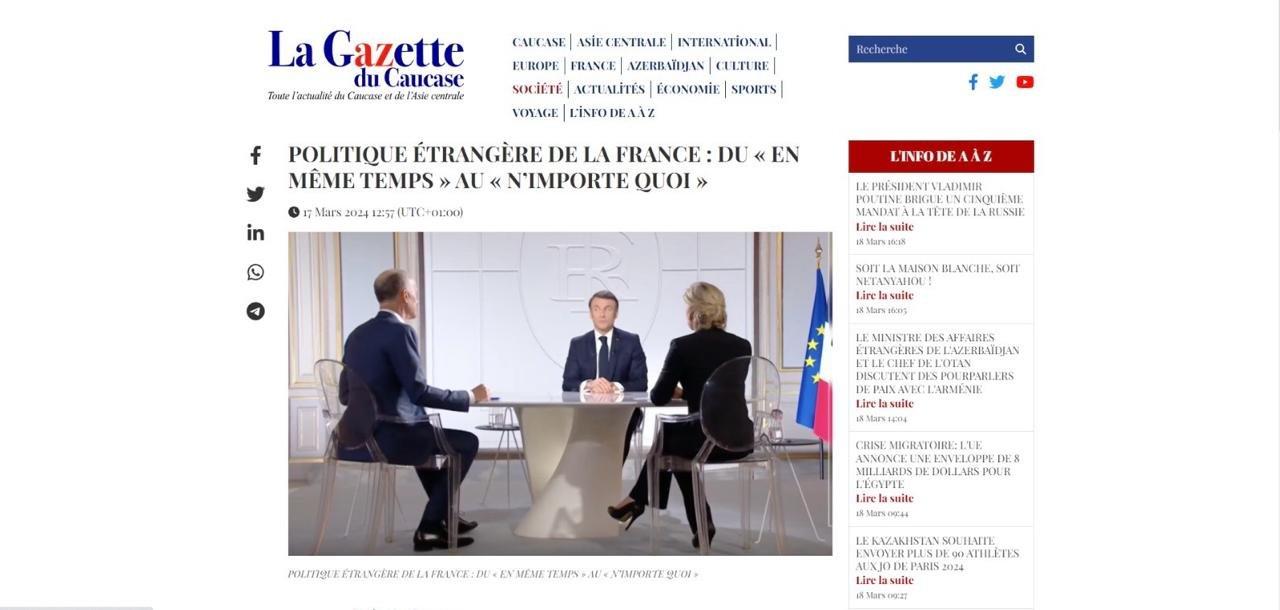
France Is Once Again Seeing History Being Written Without It - La Gazette Du Caucase
"Is there any real coherence in French foreign policy? It's very convenient, this "at the same time" that Emmanuel Macron has made his profession of faith. It allows him to say everything and the opposite of everything within the space of a few hours. It allows him to talk incessantly, to show up everywhere, in a word to exist, even if it means saying white on Monday and answering black on Tuesday.
On 26 February, the Head of State took centre stage by declaring that sending troops to Ukraine "could not be ruled out". It was a thunderous statement that took the wind out of the sails of his European counterparts, who immediately called him to order. But this hardly moved Emmanuel Macron, who was satisfied with his move and was able to rely on his favourite motto to maintain, on 12 March in the National Assembly, that "at the same time", "France is a force for peace", and to swear that there was no disagreement with his European allies. Even if this is forgetting that, whether it be his participation in the Minsk group to resolve the conflict in the Caucasus, his meeting with Vladimir Putin, or his hesitant stance on the Gaza massacres, all France's attempts at arbitration have ended in bitter failure," says Brun.
The author notes that once again, on 14 March, the media-friendly head of state put on a show in a surreal television interview in which he repeated that the military option "must not be ruled out", because "Russia cannot and must not win this war", which is "existential for Europe and for France".
"This stance, described by a large section of the political class as a "war-mongering" Matamore speech, has been suggested by some of Putin's military advisers, in the name of the theory of "strategic ambiguity", which consists of maintaining a threatening half-spoken vagueness about one's intentions in order to intimidate the adversary and dissuade him from going any further. One imagines that Putin is already trembling...
This "wet-finger" strategy is expressed in a masterly way in relation to the Middle East conflict, where France immediately aligned itself, as usual, with the American position, condemning without qualification the Hamas attacks, which were immediately described as "terrorist" by the French Presidency, and then finding itself obliged to recognise the intolerable nature of the massacre of Gazans. In an interview on 14 March, Emmanuel Macron defended himself against any spirit of vassalage towards Netanyahu, saying: "I never said that Israel had an absolute right to defend itself"," reads the article.
Brun points out that it has to be said that in time, under pressure from the American people who - unlike France - see images of the atrocities committed by Tsahal every day, Joe Biden changed his tune, condemning Israeli repression and declaring that "Netanyahu does more harm than good to Israel".
"Above all, he endorsed the figure of 30,000 Palestinians killed, thereby thumbing his nose at those who had previously disputed the figure, attributing it to Hamas propaganda. In the absence of a clear vision of what the global balance and France's geopolitical position should be, neither the French nor his allies understand exactly where the Head of State wants to take his country. Above all, this strategic wandering, combined with Emmanuel Macron's other leitmotif, his famous "Whatever it takes", is worrying the French, who are wondering whether they are not the ones who will soon have to foot the bill.
When it comes to France's policy in the Caucasus, incoherence is at its worst. France condemns Azerbaijan for freeing itself from a 28-year occupation, but "at the same time" supports Ukraine, invaded and threatened with occupation by the Russians. It participates in the sanctions imposed on Russia, but accepts that these sanctions are diverted by its Armenian friend, which is allied with Iran, one of France's favourite targets. What gallimaufry!" reads the article.
He notes that yet there is a very good explanation for this attitude.
"With no coherent foreign strategy, France is guided by domestic political considerations. The power of the Armenian lobby in France and its considerable electoral weight in France's three largest cities largely explain France's official attitude. But this is not the only reason. The right-wing drift of Macron's policy has led him to rely on frivolous theories such as the "Christian roots of France" to justify his unconditional support for Armenia, or at least for its most nationalist branch, in the name of a supposed "clash of civilisations", even though Azerbaijan should be seen as a model of inclusive secularism. Emmanuel Macron's obsessive desire to exist on the political stage has, here again, led him to rhetorical excesses, by promising to deliver arms to Armenia. In the meantime, however, the parties concerned have largely committed themselves to the bilateral peace process, with no concern for the French "gadfly". After the dismal result of its participation in the Minsk Group, France is once again seeing history being written without it," Brun concludes.

Legal Disclaimer:
MENAFN provides the
information “as is” without warranty of any kind. We do not accept
any responsibility or liability for the accuracy, content, images,
videos, licenses, completeness, legality, or reliability of the information
contained in this article. If you have any complaints or copyright
issues related to this article, kindly contact the provider above.


















Comments
No comment